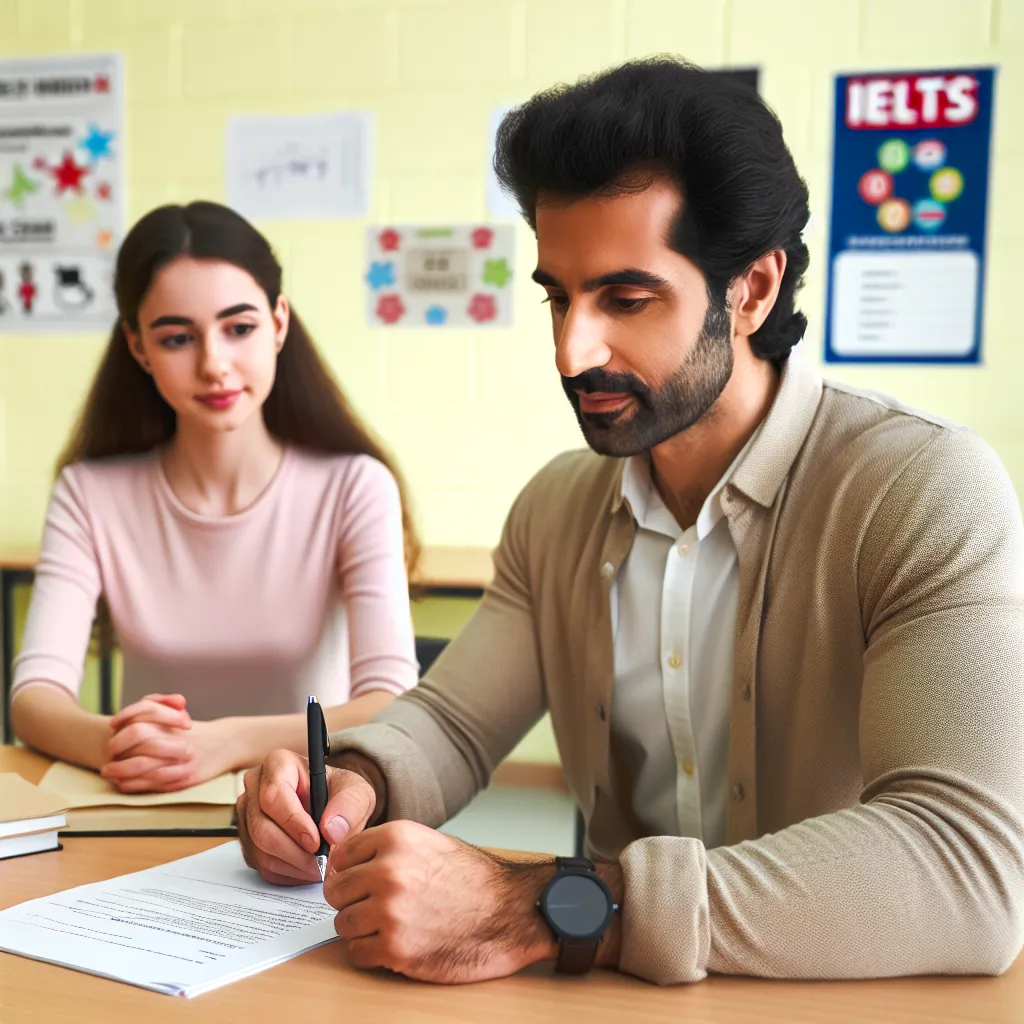As an experienced IELTS Speaking examiner, I’m here to guide you through one of the most intriguing topics that could appear in your IELTS Speaking test: describing a place you discovered online that you want to visit in person. This topic has been increasingly popular in recent years, reflecting our digital age where virtual exploration often precedes physical travel. Let’s dive into how you can ace this question and impress your examiner.
Nội dung bài viết
- Part 1: Introduction and Interview
- Q: Do you often use the internet to research places you’d like to visit?
- Q: What kind of information do you look for when researching a place online?
- Part 2: Long Turn (Cue Card)
- Follow-up Questions
- Part 3: Two-way Discussion
- Q: How has the internet changed the way people plan their travels?
- Q: Do you think virtual reality tours will ever replace actual travel?
- Key Vocabulary and Phrases for High Scores
- Examiner’s Advice
 IELTS Speaking Test Scene
IELTS Speaking Test Scene
Part 1: Introduction and Interview
In this section, the examiner may ask you some general questions about online research and travel. Here are a few potential questions and how you might answer them:
Q: Do you often use the internet to research places you’d like to visit?
Band 6-7 Answer:
“Yes, I do. I find the internet really useful for looking up information about different destinations. It helps me get an idea of what a place is like before I go there.”
Band 8-9 Answer:
“Absolutely. I’m quite passionate about travel planning, and the internet is an invaluable resource for me. I often immerse myself in virtual tours, read travel blogs, and scour through user-generated content to get a comprehensive understanding of potential destinations. It’s fascinating how much you can learn about a place before ever setting foot there.”
Q: What kind of information do you look for when researching a place online?
Band 6-7 Answer:
“I usually look for information about the main attractions, local food, and how to get around. I also check reviews from other travelers to see what they thought about the place.”
Band 8-9 Answer:
“When I’m researching a destination online, I tend to delve deep into various aspects. Beyond the obvious tourist attractions, I’m particularly interested in off-the-beaten-path experiences, local cultural nuances, and sustainable travel options. I also pay close attention to seasonal variations, local events, and insider tips from residents or frequent visitors. This comprehensive approach helps me curate a more authentic and immersive travel experience.”
Part 2: Long Turn (Cue Card)
Now, let’s move on to the main topic. Here’s a potential cue card you might receive:
Describe a place you discovered online that you want to visit in person.
You should say:
- What the place is
- How you found out about it online
- What attracted you to this place
- And explain why you want to visit it in person
Band 6-7 Answer:
“I’d like to talk about a place I discovered online called Cappadocia in Turkey. I first came across it while scrolling through Instagram. The images of hot air balloons floating over a unique landscape really caught my eye.
What attracted me to Cappadocia was its unusual rock formations, known as ‘fairy chimneys’. These tall, cone-shaped rock structures look like something from another planet. I also learned that people have carved homes and hotels into these rocks, which I found fascinating.
I want to visit Cappadocia in person because I think seeing it with my own eyes would be much more impressive than just looking at pictures. I’d love to take a hot air balloon ride to see the landscape from above and explore the underground cities that were built there centuries ago. It seems like a place that offers a unique mix of natural beauty and historical interest.”
Band 8-9 Answer:
“I’d be delighted to share with you a place I stumbled upon during one of my virtual explorations – the enchanting region of Cappadocia in central Turkey. I serendipitously discovered this otherworldly landscape while delving into a travel photography forum, where a series of breathtaking images instantly captivated my attention.
What drew me in was Cappadocia’s surreal topography, characterized by its distinctive ‘fairy chimneys’ – whimsical rock formations sculpted by millennia of natural erosion. The sight of colorful hot air balloons dotting the sky at dawn, juxtaposed against this lunar-like terrain, created an ethereal scene that seemed almost too fantastical to be real.
My fascination deepened as I uncovered the rich historical tapestry of the region. The ingenuity of ancient civilizations who carved intricate underground cities and rock-hewn churches into the soft volcanic rock astounded me. This seamless blend of natural wonder and human creativity resonated deeply with my interests in geology and cultural heritage.
I’m eager to experience Cappadocia in person because I believe no virtual encounter can truly capture the magic of being there. I long to feel the crisp morning air as I float silently in a hot air balloon, watching the sun paint the landscape in warm hues. I want to lose myself in the labyrinthine underground cities, marveling at the ingenuity of their creators. Most importantly, I hope to gain a deeper appreciation for the interplay between nature’s artistry and human adaptation by immersing myself in this unique environment. Cappadocia represents, to me, a perfect synthesis of natural beauty, historical significance, and cultural richness – a trifecta that promises an unforgettable and enlightening travel experience.”
Follow-up Questions
- How did the online information influence your desire to visit this place?
Band 6-7 Answer:
“The online information really increased my interest in visiting Cappadocia. The photos I saw were very impressive, and reading about the history of the place made me want to see it for myself.”
Band 8-9 Answer:
“The online information played a pivotal role in kindling my wanderlust for Cappadocia. It served as a gateway, providing me with a tantalizing glimpse of the region’s myriad attractions. The visually stunning content I encountered online effectively showcased the unique beauty of the landscape, while the in-depth articles and historical accounts I read added layers of depth to my understanding of the area’s cultural significance. This virtual introduction not only piqued my curiosity but also allowed me to envision the rich, multifaceted experience that awaiting me, thereby cementing my resolve to visit in person.”
- Do you think online information can fully represent a place?
Band 6-7 Answer:
“No, I don’t think online information can fully represent a place. While it can give you a good idea, there are many things you can only experience by being there in person, like the atmosphere and the local culture.”
Band 8-9 Answer:
“While online information can provide a wealth of insights and visual representations, I firmly believe it falls short of fully encapsulating the essence of a place. The internet can offer a valuable preview, but it inevitably lacks the sensory richness and emotional resonance of firsthand experience. The subtle nuances of local culture, the ambient sounds and scents, the tactile sensations, and the serendipitous encounters that often define travel experiences are elements that cannot be adequately conveyed through a screen. Moreover, the emotional impact of witnessing a breathtaking landscape or immersing oneself in a foreign culture is something that must be felt rather than seen or read about. In this sense, online information serves as an appetizer, whetting our appetite for the full course of in-person exploration.”
Part 3: Two-way Discussion
In this section, the examiner will ask you more abstract questions related to the topic. Here are some potential questions and answers:
Q: How has the internet changed the way people plan their travels?
Band 6-7 Answer:
“The internet has made planning trips much easier. People can now find information about destinations, book flights and hotels, and read reviews from other travelers all in one place. It’s also made it possible to discover new places that we might not have known about before.”
Band 8-9 Answer:
“The advent of the internet has revolutionized travel planning in myriad ways. It has democratized information, allowing travelers to access a wealth of resources that were once the domain of travel agents. This shift has empowered individuals to curate their own experiences, tailoring itineraries to their specific interests and preferences.
Moreover, the internet has fostered a culture of virtual exploration, enabling people to immerse themselves in potential destinations long before they embark on their journey. This pre-trip engagement often enhances the actual travel experience by building anticipation and allowing for more informed decision-making.
However, this information abundance also presents challenges. Travelers now face the task of sifting through vast amounts of data, which can be overwhelming. Additionally, the prevalence of curated content on social media platforms has created unrealistic expectations in some cases, potentially leading to disappointment when reality doesn’t match the idealized online portrayal.
Despite these challenges, I believe the internet has ultimately enriched the travel planning process, making it more accessible, personalized, and dynamic than ever before.”
Q: Do you think virtual reality tours will ever replace actual travel?
Band 6-7 Answer:
“I don’t think virtual reality tours will completely replace actual travel. While they might be useful for people who can’t travel due to health or financial reasons, they can’t provide the full experience of being in a different place and culture.”
Band 8-9 Answer:
“While virtual reality technology is advancing at an impressive rate, I’m skeptical that it will ever fully supplant the experience of physical travel. VR tours certainly have their merits – they can provide accessibility to those with physical limitations, offer sustainable alternatives to carbon-intensive travel, and serve as valuable educational tools. They may even enhance our travel experiences by allowing us to preview destinations or revisit cherished locations.
However, travel is about more than just visual stimulation. It’s a multisensory experience that engages all our faculties – the taste of local cuisine, the scent of unfamiliar spices in a market, the feeling of sand between our toes, or the sound of a foreign language. Moreover, travel often involves personal growth through challenging our preconceptions, adapting to new environments, and engaging with different cultures in real-time.
That said, I believe VR will increasingly complement physical travel rather than replace it. It might alter the landscape of tourism by encouraging more purposeful and mindful travel, with people using VR to refine their choices and then seeking out in-depth, authentic experiences when they do travel physically. In this way, VR could potentially lead to more meaningful and impactful travel experiences overall.”
Key Vocabulary and Phrases for High Scores
To elevate your speaking performance, incorporate these sophisticated words and phrases:
-
Serendipitously (adverb) /ˌser.ən.ˈdɪp.ə.təs.li/: by chance in a happy or beneficial way
Example: “I serendipitously discovered this hidden gem while browsing travel blogs.” -
Ethereal (adjective) /ɪˈθɪə.ri.əl/: extremely delicate and light in a way that seems not to be of this world
Example: “The ethereal beauty of the Northern Lights left me speechless.” -
Juxtapose (verb) /ˈdʒʌk.stə.pəʊz/: to put people or things side by side, especially to compare them or to create an interesting effect
Example: “The modern skyscrapers juxtaposed against the ancient temples create a fascinating cityscape.” -
Myriad (noun/adjective) /ˈmɪr.i.əd/: a very large number of something
Example: “The country offers a myriad of cultural experiences for tourists.” -
Immerse (verb) /ɪˈmɜːs/: to become completely involved in something
Example: “I love to immerse myself in the local culture when I travel.”
Examiner’s Advice
To excel in the IELTS Speaking test, particularly when describing a place you discovered online:
-
Develop your vocabulary: Use a range of descriptive words to bring your chosen place to life. Practice using less common adjectives and adverbs to add sophistication to your speech.
-
Structure your answer: In Part 2, organize your thoughts according to the prompts given. This demonstrates good coherence and cohesion.
-
Provide specific details: Don’t just give general information. Include specific facts or personal reflections to make your answer unique and engaging.
-
Practice speaking for 2 minutes: For Part 2, you need to speak for 1-2 minutes. Practice with a timer to ensure you can speak fluently for this duration.
-
Expand on your answers: In Part 3, don’t just give short responses. Develop your ideas with explanations, examples, or personal experiences.
-
Stay on topic: While it’s good to elaborate, make sure your answers remain relevant to the question asked.
-
Use a variety of grammatical structures: Incorporate complex sentences and different tenses to showcase your language proficiency.
-
Be authentic: While it’s important to use sophisticated language, make sure you sound natural and confident. Practice incorporating advanced vocabulary into your everyday speech.
Remember, the key to success in the IELTS Speaking test is preparation and practice. The more you familiarize yourself with potential topics and practice articulating your thoughts, the more confident and fluent you’ll become.


